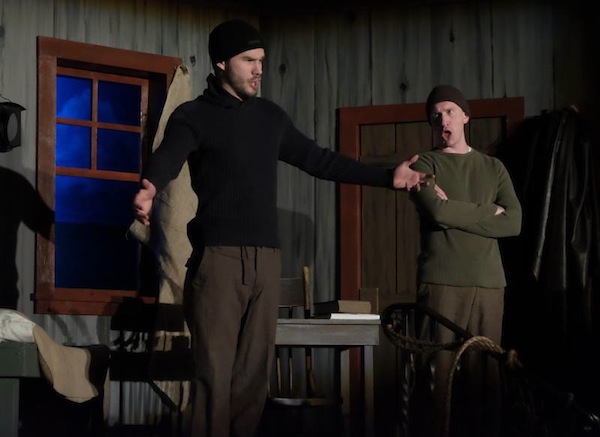Evanston Chamber Opera debuts with a lightweight lighthouse premiere

It’s a testament to the richness of musical activity in Chicagoland that a contemporary opera can premiere in a tiny church in Evanston on a weekend of heavy snows and still draw a respectable crowd.
Following the premiere of Francis Lynch’s Christmas opera, Joseph’s Gift in 2016, the composer and his production colleagues decided to formalize their stage efforts by creating a new company. The result is Evanston Chamber Opera (EChO), incorporated just last summer. The first fruit of this venture is Lynch’s new opera, For Those in Peril, which received its world premiere Friday night at St. Matthew’s Episcopal Church.
The scenario (libretto by Lynch and Raymond Humphreys) draws upon the true story of the 1801 tragedy at Smalls Lighthouse, off the coast of Wales. Thomas Howell and Thomas Griffith, men with a history of mutual dislike, were both posted to the lighthouse. The increasing antagonism and conflicts between the two men eventually led to the death of Howell and the psychological disintegration of Griffith.
The 2016 film, The Lighthouse, was also based upon the Smalls tragedy; Peter Maxwell Davies mined a similar lighthouse mystery in his 1980 opera of the same name, though that was based on a different historical incident.
Two men with long-standing mutual hatred confined in close quarters, inexorable mounting antagonism, a violent confrontation, death and insanity—seemingly, that’s more than enough juicy ingredients to make a terrific and compelling opera. Unfortunately, For Those in Peril ain’t it.
Evanston Chamber Opera deserves credit for launching their existence with a world premiere by a local composer. And if Friday night’s staging and performances often had a community-theater feel to the proceedings, it was not for lack of effort and dedication on the part of those involved.
The libretto is sensible enough, charting the arrival of the two men at the lighthouse, and alternating their desperate situations with the increasing worry and despair of their lonely wives, reflecting in letters written from the spouses.
The main problem with For Those in Peril is Lynch’s music. The dominant mode of the opera is an amiable, seesawing moderato. Lynch’s score is tonal, accessible and falls easily on the ears. But over the 2-1/2-hour length of the opera (counting one intermission) that’s not enough. There is little dramatic bite or essential musical contrast in material, tempo, or dynamics; the unvaried music quickly grows repetitive and fatally monotonous.
Most crucially, Lynch’s genial music rarely seems to connect with the dark drama happening on the tiny stage. Apart from some slight quickening of string pizzicatos from the mixed instrumental quintet, there is little sense of danger, urgency or mounting violence in the sunny, uncomplicated score, much less music that reflects Griffith’s descent into madness.
Lynch’s opera ultimately feels too musically lightweight as well as way overlong for its slight material. Still, some substantial trimming might aid its chances of future performances. (The framing device of a female Narrator, aka “the Morning and Evening Star” felt like it waltzed in awkwardly from another century and should be the first thing to go.) One could see a shortened one-act version of For Those in Peril finding a future with university music departments as a useful work with multiple roles and modest instrumental forces.
The opera is being presented with two alternating casts. The acting ranged from acceptable to barely rudimentary Friday night but some voices stood out.
Karlos Piñero-Mercado displayed the most impressive voice as Howell, singing in a strong, vital tenor with fine clarity and force. The Puerto Rican singer didn’t succeed in bringing much dramatic depth to the role, with Griffith’s antagonist seeming merely annoying with his constant complaining. None of the cast is helped by the talky libretto, which suffers from a lack of character development across the board.
As the surviving Griffith, Maxwell Seifert seemed equally ill-equipped for the dramatic demands of the role, though the young artist showed a worthy baritone and sang more effectively and with greater impact as the evening unfolded.
As his wife, Madeline, Angela Torres-Kutkuhn sang with a deep contralto-like mezzo and brought the most professional acting chops to the role of Griffth’s suffering wife.
Hilary Esqueda as Howell’s wife Gwendolyn and Ivo Suarez as Captain Williams were solid. Rachael Long did what she could with the thankless Narrator assignment; young tenor Nicholas Metzger sounded stretched in the high writing for the lighthouse architect, Whiteside.
As with the loud and generalized vocalism, a greater dynamic and expressive range in the playing of the chamber ensemble might have made a better case for Lynch’s music. Still, conductor James Janssen kept the evening on track, leading a fluent and capable performance. The mixed quintet of seasoned area freelancers (violinist Kate Carter, violist Vannia Phillips, cellist Elizabeth Anderson, flutist Cindy Fudala and clarinetist Cory Tiffin) acquitted themselves well in this premiere.
For Those in Peril may not be a timeless masterpiece, but it’s heartening to see a new opera startup in Evanston. A company spokesperson said Evanston Chamber Opera plans to do just one opera a season and one looks forward to seeing what EChO has in store for 2019.
For Those in Peril will be repeated with alternating casts 7:30 p.m. Saturday and February 16 and 17 at St. Matthew’s Episcopal Church in Evanston. evanstonchamberopera.org
Posted in Performances




